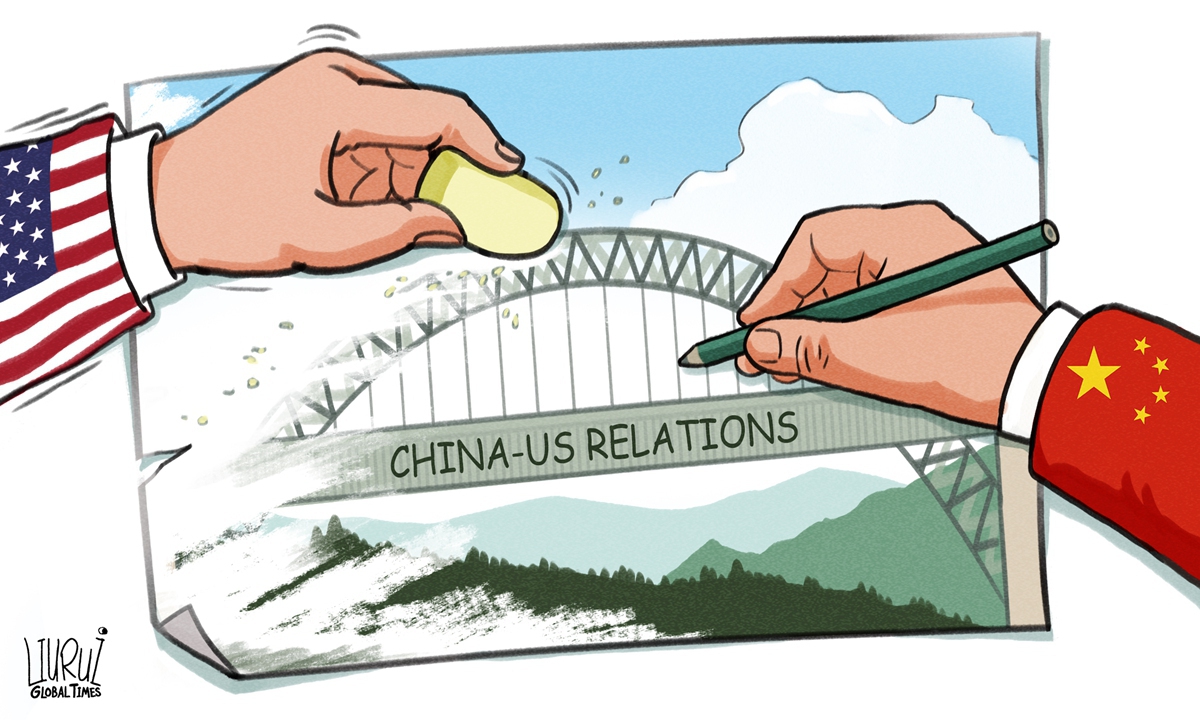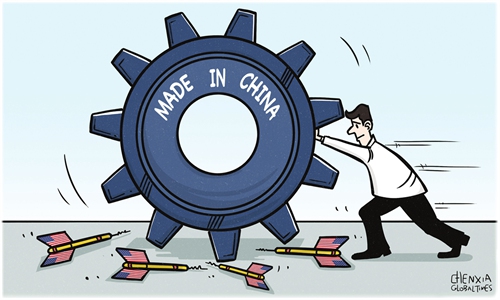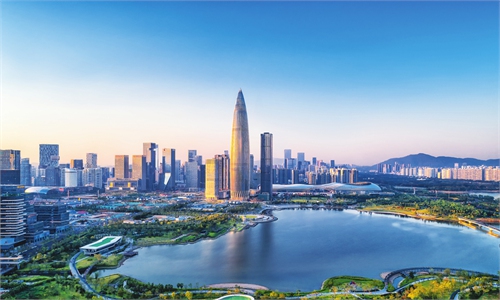
China-US relationship. Illustration: Liu Rui/GT
The US State Department announced that it has invited China's newly reappointed Foreign Minister Wang Yi, who is also director of the Office of the Central Commission for Foreign Affairs, to visit the US, while the Chinese side released no information about the invitation as of press time despite confirmation of the meeting between a senior Chinese diplomat and senior US officials from the State Department and National Security Council in Washington.
Chinese experts said on Wednesday that the US remains provocative and aggressive against China on many affairs including the most sensitive Taiwan question, so even if China accepts the US request to maintain communication during the intense struggle, it does not mean that China-US tension is easing. The Biden administration should therefore not expect that the worsening bilateral ties are manageable if it shows no sincerity to correct the mistakes it has made.
The Chinese Foreign Ministry said in a statement released on Tuesday on its website that Yang Tao, Director-General of the North American and Oceania Affairs of the Chinese Foreign Ministry, had consultations with US Assistant Secretary of State for East Asian and Pacific Affairs Daniel Kritenbrink and White House National Security Council's Senior Director for China Affairs Sarah Beran in Washington. The two sides had "candid, in-depth and constructive exchanges of views on China-US relations as well as global and regional issues of mutual interest and concern."
The US State Department said on Tuesday that the US has "formally invited Wang to Washington," Reuters reported. The invitation to Wang was extended on Monday during a meeting at the State Department between Kritenbrink and Yang, State Department spokesperson Matthew Miller told a press briefing.
Miller did not say if the Chinese side had accepted the invitation but added that "this was Washington's expectation," according to Reuters. "We certainly expect that it is something that they would accept and is a trip that we expect to happen, but we have not yet scheduled a date," Miller said.
In the statement released by the Chinese Foreign Ministry, nothing about the invitation was mentioned, although it stressed that "Yang expounded China's solemn position on the Taiwan question."
The US' provocation on the Taiwan question has continued. The White House website recently announced that the US has decided to provide approximately $345 million worth of military assistance to the island of Taiwan. This is the first time the Biden administration has used the "presidential drawdown authority" to provide military aid to the island.
The White House said Friday the package would include defense, education and training for the people on the island, the Associated Press (AP) reported citing two US officials who spoke on the condition of anonymity to discuss sensitive matters.
US lawmakers have been pressuring the Pentagon and White House to speed weapons to the Taiwan island. The goals are reportedly to help it counter China, AP said.
Washington will send man-portable air defense systems, or MANPADS, intelligence and surveillance capabilities, firearms and missiles, according to two US officials who spoke on the condition of anonymity to discuss sensitive matters, the AP reported.
The Chinese Foreign Ministry responded on Wednesday that US provision of military aid for China's Taiwan region seriously violates the one-China principle and the stipulations of the three China-US joint communiqués, especially the August 17 Communiqué.
Such moves seriously undermine China's sovereignty and security interests, and harm China-US relations and peace and stability across the Taiwan Strait. China strongly deplores and firmly rejects this and has made serious démarches to the US side, the ministry said in a statement.
"The Taiwan question is the very core of China's core interests and the first red line that must not be crossed in the China-US relationship. We urge the US to earnestly abide by the one-China principle and the three China-US joint communiqués, stop enhancing military contact with the Taiwan region or arming it by any means or under whatever pretext, stop creating factors that could heighten tensions in the Taiwan Strait, and stop conniving at and supporting the separatists' attempt to seek 'Taiwan independence' by force," said the statement.
"No one should underestimate the determination, resolve and capability of the Chinese people in safeguarding our sovereignty and territorial integrity," the ministry said in a statement in answer to a relevant question from the press.
Chinese Defense Ministry spokesperson Tan Kefei said on Tuesday that "We urge the US to stop all forms of military collusion with Taiwan and not to further deviate from the wrong and dangerous path. The historical wheel of China's reunification is rolling forward, and no one or any force can stop it."
"The Chinese People's Liberation Army (PLA) closely monitors the situation in the Taiwan Strait, maintains a high level of alertness, resolutely defends national sovereignty and territorial integrity, and firmly maintains peace and stability in the Taiwan Strait," he said.
Lü Xiang, an expert on US studies and a research fellow at the Chinese Academy of Social Sciences, told the Global Times on Wednesday that while it continues to ask for communication with senior Chinese officials, the US has never stopped its provocations and aggressions on the Taiwan question and other issues like containment against China's normal sci-tech development and illegitimate sanctions against Chinese individuals and institutions.
"By asking for engagements and communication, the US is trying to legitimize its provocations against China, and then normalize the tensions, and the next step is to escalate it," Lü said. In other words, the US is trying to push China to compromise on its bottom-line and weaken China's determination to take countermove by releasing signals for communications but showing no concrete sincerity to stop its hostile moves against China, he said.
Therefore, even China is open to communications, it does not mean the two sides can ease the tension, and the struggles will continue. China will not hesitate to take countermeasures if the US launches new provocations, and in the future, if the US continues on this path, meetings between senior officials of the two countries might not lead to de-escalation, analysts warned.
Li Haidong, a professor at the China Foreign Affairs University, told the Global Times on Wednesday that "China and the US' demands for communication are very different. China wants to find the possibility of cooperation from communications, and the precondition is mutual respect on core interests; the US wants to find China's bottom-line and avoid direct conflict with China when it refuses to stop its highly risky and hostile struggle against China."
The two sides will keep communicating, but the world will find that the US shows no respect or sincerity, and the struggles, competition and even confrontation in some aspects will continue as well, Li noted.
According to the Taiwan external affairs authority on Wednesday, Taiwan secessionist Democratic Progressive Party's (DPP) candidate for the 2024 regional election Lai Ching-te, also deputy regional leader, will make "stopovers in New York on August 12 and San Francisco on August 16" during an August 12-18 trip to Paraguay.
Analysts from both sides of Taiwan Straits are concerned that this will become a new incident to worsen tension in the Taiwan Straits and another evidence of US' encouragement toward Taiwan secessionism, which is an absolute contradiction to US' promises to China on "opposing Taiwan Independence." It is too early to predict what will happen at the the 2023 Asia-Pacific Economic Cooperation Leaders' Meeting or the G20 Leaders' Summit which will be held later this year, or if there will be another China-US summit, because the US side is creating too many uncertainties that could ruin its plan to engage with China, said the experts.




